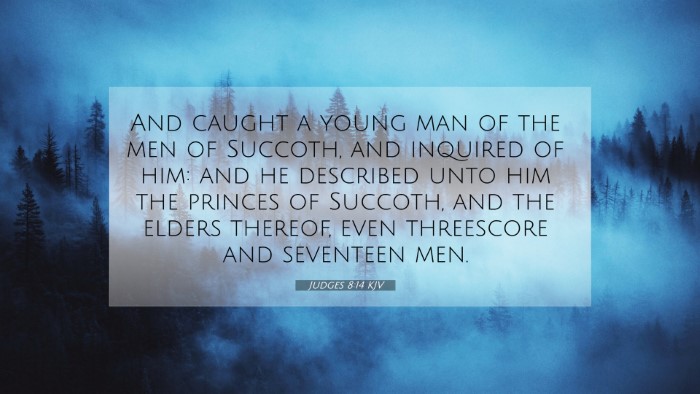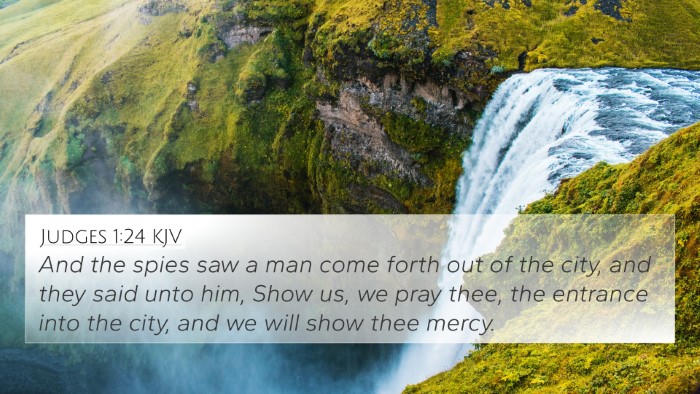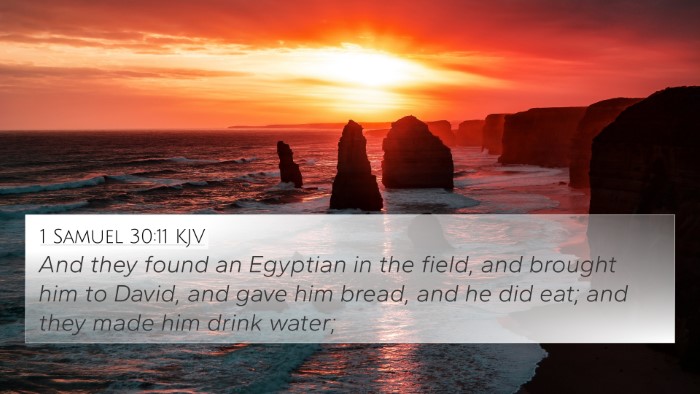Understanding Judges 8:14
Judges 8:14 states, "And he caught a young man of the men of Succoth, and inquired of him: and he wrote him the princes of Succoth, and the elders thereof, even threescore and seventeen men."
This verse occurs in the context of Gideon's campaign against the Midianites. It describes an episode where Gideon, after defeating the Midianite leaders Zeba and Zalmunna, seeks assistance from the people of Succoth, who refuse to help him during his time of need. The verse highlights important themes such as leadership, the consequences of inaction, and the need for collective support in the face of adversity.
Commentary Insights
The examination of Judges 8:14 through various public domain commentaries reveals rich insights into the socio-political dynamics of ancient Israel, theological implications, and practical applications for believers today. Below are synthesized interpretations from renowned commentaries:
Matthew Henry’s Commentary
Matthew Henry emphasizes the nature of leadership as Gideon embodies the role of a military leader demanding accountability from his own people, which reflects God’s expectations for unity and support among His followers. The refusal of Succoth highlights a lack of faith and solidarity among the Israelites, which invites readers to consider how they respond to God’s appointed leaders.
Albert Barnes’ Notes on the Bible
Albert Barnes elaborates on the historical context and significance of Gideon's actions. He points out that Gideon’s inquiry into the city’s leadership showcases a pivotal moment of accountability, where he seeks to identify those who have shown cowardice. The act of writing down the names indicates the seriousness of their refusal to aid him and serves as a public testimony against them.
Adam Clarke’s Commentary
Adam Clarke offers a detailed analysis of the cultural factors at play in Succoth's refusal to assist Gideon. He notes how fear of retaliation from the Midianites influenced their decision. Clarke argues that this incident serves as a cautionary tale about how fear can prevent individuals and communities from supporting righteous causes. This refusal later leads to consequences, illustrating the inevitable repercussions of failing to act righteously.
Thematic Connections
Judges 8:14 resonates with various themes prevalent throughout Scripture, providing a framework for deeper understanding:
- Courage versus Cowardice: The refusal of Succoth aligns with Jesus' teachings on the necessity of courage in following Him (Luke 9:62).
- Accountability: The concept of public accountability shines through in biblical narratives, such as in Acts 5:1-11 concerning Ananias and Sapphira.
- The Role of Leaders: Reflecting the duties of leaders as described in Jeremiah 23:4, where God's shepherds are accountable for their flocks.
- Faith in Action: This is echoed in James 2:17, where faith without works is dead—challenging believers to take action alongside faith.
- Community Support: Reflects the call to mutual support found in Galatians 6:2, encouraging believers to bear one another’s burdens.
Cross-References for Judges 8:14
In exploring Judges 8:14, several cross-references highlight its themes and implications:
- Exodus 17:8-13: Another instance of Israel's military reliance on unity in battle.
- 1 Samuel 10:27: A reflection on the rejection of divine leadership and support.
- 1 Kings 18:21: Elijah's call for decision-making among the Israelites, similar to Gideon's moment.
- Matthew 10:14: The New Testament echo of receiving or rejecting support related to God’s messengers.
- Hebrews 10:24-25: A call to consider how to spur one another on towards love and good deeds, contrasting Succoth’s cowardice.
- Romans 12:3: Considering humility and service; encouraging unity in the body of Christ akin to Gideon’s expectation.
- Revelation 3:15-16: The necessity of being hot or cold in faith; reflecting the indecisiveness of Succoth.
Practical Applications
The story in Judges 8:14 serves as a profound reminder for contemporary believers. It challenges us to examine our own responses to godly leadership and the calling to support each other within the community of faith.
In our walk with God, we are invited to actively demonstrate our faith through actions. The refusal of Succoth to assist Gideon is a stark warning against hesitation in faith during challenging times. Believers are called to be sources of support, encouragement, and action in the face of adversity, fostering an environment of unity and resilience.
Conclusion
Judges 8:14 encapsulates a crucial moment that reflects broader themes of faith, support, and accountability within the community of believers. Understanding this verse through the lens of cross-references facilitates deeper insight into the scriptural narrative and enriches the comprehension of God’s call for unity and action among His people.




